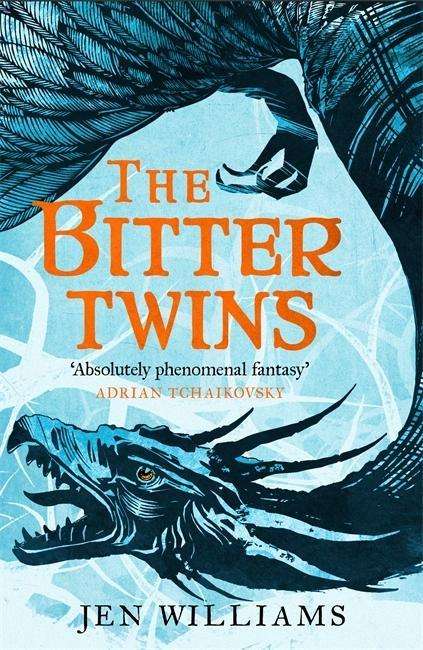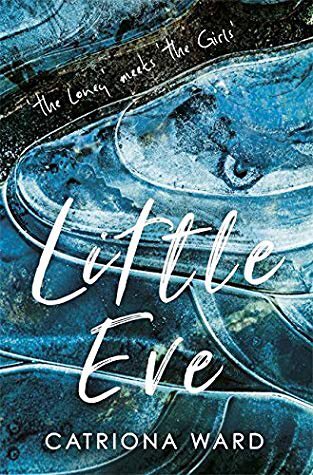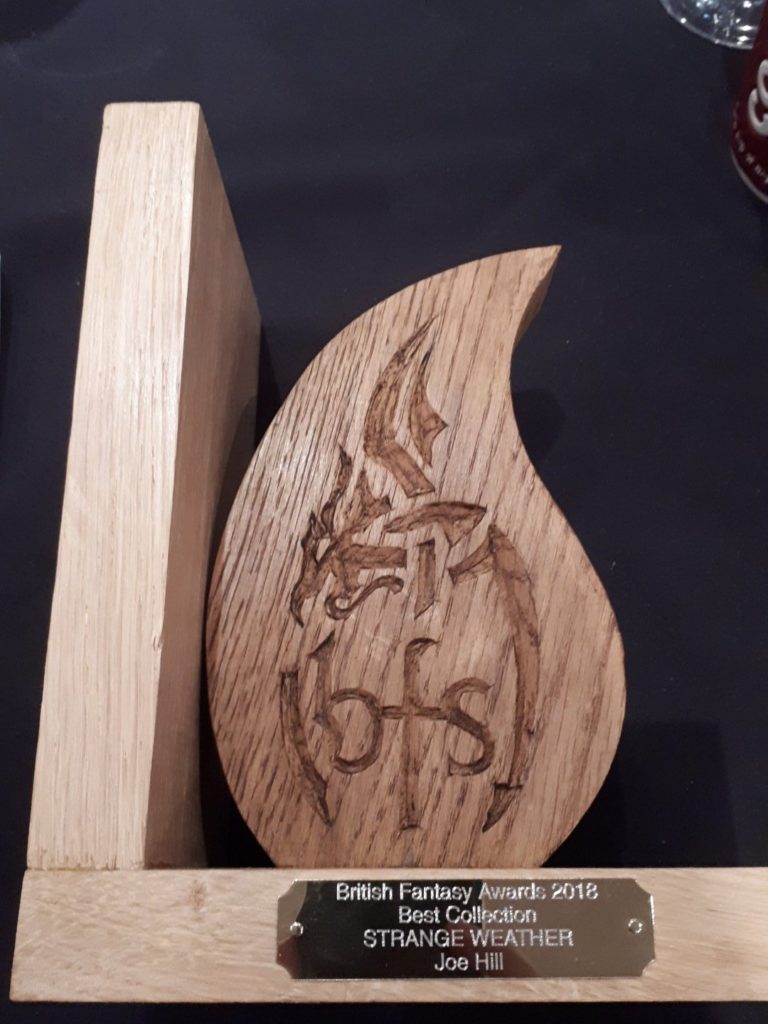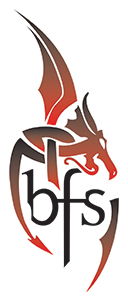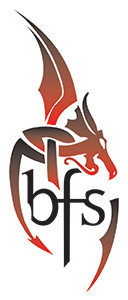(1) JURY SUMMONS. Two groups are recruiting jurors for their annual awards.
The British Fantasy Society’s call is here.
If you are interested in being a juror for this year’s awards, please register your interest here We are especially interested in hearing from those historically under represented on juries; and you do not need to be a member of the BFS to fulfil this role.
Both forms will remain open until Wednesday 16th August.
Any questions, please get in touch at [email protected]
A few days ago they were concerned about the balance of applicants:
The Aurealis Awards also are looking – “Aurealis Awards 2020 – Call for Judges”. Full requirements at the link.
We are seeking expressions of interest from Australian residents who would like to judge for the 2020 Aurealis Awards. Judges are volunteers and are drawn from the Australian speculative fiction community, from diverse professions and backgrounds, including academics, booksellers, librarians, published authors, publishing industry professionals, reviewers and enthusiasts. The only qualification necessary is a demonstrated knowledge of and interest in their chosen category (good time management skills and an ability to work in a team in an online environment are also essential).
(2) ULTIMA RATIO REGUM. Camestros Felapton continues to work out what canon means to sff readers, and if it’s useful in “Types of canon/key texts”.
… I think within discussions of canon there is a sense of books whose role it is to edify the reader, the books that will make you (somehow) a better reader. I’m sceptical that any books really fit that criteria and even more sceptical that we can find a common set of such books. However, there are clearly books that themselves provoke further books and as such books that get referenced in later works and later works that can be seen as response to earlier works. Robert Heinlein’s Starship Troopers being an obvious example of such a work. This is canon as a kind of feedback loop of significance — the books that are themselves critiques of Troopers lend significance to Troopers as a book. You don’t have to have read Starship Troopers to enjoy Kameron Hurley’s Light Brigade but having some familiarity with Heinlein’s book adds an element to Hurley’s book.
(3) HEATED WORDS. As someone wrote on Twitter: “The phrase ‘You couldn’t make Blazing Saddles today’ takes on an entirely new meaning.” CBR.com has the story: “Blazing Saddles Is Being Remade as an Animated Samurai Movie About Cats and Dogs” .
Mel Brooks’ Blazing Saddles is considered a film classic, even though it’s stirred up some controversy over the years. Now the film is being retold in an entirely new medium, as well as an entirely new genre.
The Los Angeles film company Align is helping develop an animated film titled Blazing Samurai. The film takes the basic premise of Blazing Saddles and transplants it to the Samurai era. The story follows a dog named Hank who dreams of becoming a Samurai. When he becomes in charge of protecting Kakamucho, he learns that the town is populated entirely by cats.
(4) A GOLDEN AGE. Galactic Journey does a rundown on the 1964-1965 television season: “[AUGUST 8, 1965] NAVIGATING THE WASTELAND #2 (1964-65 IN (GOOD) TELEVISION)”. I was 12 around then so no wonder I remember this as the Golden Age of TV. The Traveler obviously has a later bedtime than I did that year, because I never got to watch his favorite, Burke’s Law —
Three years ago, I reported on the state of television in the wake of former FCC-chief Newton Minow’s pronouncement that television was a ‘vast wastelend.’ Since then, I have remained a devoted fan of the small screen, if not completely addicted to ‘the boob tube.’ Indeed, the Young Traveler and I have our weekly favorites we do not miss if we can at all help it.
And so, as we sail through the sea of summer reruns, gleefully anticipating the Fall line-up, I take delight in awarding the Galactic Stars of Television for the 1964-65 season.
Burke’s Law 1963-65
Amos Burke is what would have happened if Bruce Wayne’s parents had never been shot – he’s a Beverly Hills playboy millionaire who also happens to be the dapper Captain of Homicide for the L.A. Police Department. In each episode, Amos, with the aide of grizzled Sergeant Hart and youthful Detective Tilson (and occasionally the doe-eyed Sergeant Ames), solves a murder mystery…..
If The Traveler hadn’t waxed rhapsodically about this show – and I’m not sure whether he thinks it fits the blog’s sff theme or just thinks it’s good – then it wouldn’t have seemed such a glaring oversight to end the post pointing out Harlan Ellison wrote a script for the lamentable Voyage to the Bottom of the Sea, without mentioning Ellison also wrote four scripts for 1964 episodes of his beloved Burke’s Law series.
(5) SINCE 1984. Jane Johnson looks back on “A life in publishing”.
I realised this morning that it’s 36 years to the day when I started to work in publishing, as an editorial secretary at George Allen & Unwin Publishers, in Ruskin House on Museum Street. What follows really is the trajectory of modern publishing in microcosm.
My skillset was not ideal: I loved books, especially the works of JRR Tolkien and came with a first class English degree, a Masters in Scandinavian Studies (Old Icelandic) and absolutely no secretarial abilities at all. But I had worked for a year at Foyles and another as a boardmarker/cashier at Ladbrokes, and so had proved I could work hard and not be snooty about getting my hands dirty; and that I was numerate and understood the concept of gambling, which my new boss assured me was the essence of publishing. These were the times of Telex machines and manual typewriters, which were just giving way to electronic typewriters (my nightmare) but David was remarkably patient with my Tippexed letters, blackened carbon copies and non-existent shorthand, and within a year had promoted me away from my disaster zone to become an editor. Paperbacks were a fairly new concept: hardbacks were the prestige edition.
(6) IMPROVEMENT NOT NEEDED. In a post on Facebook, David Gerrold tells how a book is being unfairly belittled.
There is currently a backlash against The Giving Tree, and some people are circulating an alternate ending.
Hey! I have an idea. I have an alternate ending for Winnie The Pooh. Pooh is a bear. He decides he likes bacon. He eats Piglet. Much more realistic, right?
No, look. Shel Silverstein knew what he was doing when he wrote The Giving Tree.
It doesn’t need an alternate ending — specifically not one that’s preachy, badly written, doesn’t really fit, and is intended to cast the original in a bad light….
(7) TAKING THE MINUTES. In “Six Novels That Bring Together Mystery And Time Travel” on CrimeReads, Julia McElwain recommends novels by Stephen King, Dean Koontz, and Lauren Beukes as time travel novels mystery readers might like.
Depending upon how it’s done, it can add to the tension—a race against time as our characters try to return to their own era—or it can allow readers to explore the past through modern eyes. In my own In Time mystery series, I’ve enjoyed the fish-out-of-water sensation that my main character—a modern-day woman and brilliant FBI agent—experiences after being tossed back to the Regency period in England. As women then were second-class citizens without the ability to even vote, not only does she have to deal with personal obstacles, but she also cannot tap into her usual arsenal of forensic tools to solve crimes.
Whether time travel is being used to wrap a mystery in an extra, innovative layer or is allowing readers to view humanity and history through a different lens, the theme is brilliantly done in the books that I’ve listed below….
(8) ALLEN OBIT. A software pioneer has died: “Frances Allen, Who Helped Hardware Understand Software, Dies at 88” in the New York Times.
Frances Allen, a computer scientist and researcher who helped create the fundamental ideas that allow practically anyone to build fast, efficient and useful software for computers, smartphones and websites, died on Tuesday, her 88th birthday, in Schenectady, N.Y.
Her death, in a nursing home, was confirmed by her great-nephew Ryan McKee, who said the cause was Alzheimer’s disease.
In the mid-1960s, after developing software for an early supercomputer at the National Security Agency, Ms. Allen returned to her work at IBM, then the world’s leading computer company. At an IBM lab in the Hudson River Valley town of Yorktown Heights, just north of New York City, she and her fellow researchers spent the next four decades refining a key component of modern computing: the “compiler,” the software technology that takes in programs written by humans and turns them into something computers can understand.
For Ms. Allen, the aim was to do this as efficiently as possible, so programmers could build software in simple and intuitive ways and then have it run quickly and smoothly when deployed on real-world machines.
Together with the researcher John Cocke, she published a series of landmark papers in the late 1960s and ’70s describing this delicate balance between ease of creation and speed of execution. These ideas helped drive the evolution of computer programming — all the way to the present day, when even relative novices can easily build fast and efficient software apps for a world of computers, smartphones and other devices.
In 2006, on the strength of this work, Ms. Allen became the first woman to win the A.M. Turing Award, often called the Nobel Prize of computing.
(9) MEDIA BIRTHDAY.
- August 8, 1956 — X Minus One aired “The Last Martian.” This is the story of a reporter seeing if a man’s claim that he is a Martian placed in a human’s body. George Lefferts was the scriptwriter who adapted the story from the Fredric Brown’s “The Last Martian” short story first published in Galaxy Science Fiction in October 1950. Mandel Kramer, Elliot Reed, Santos Ortega, Ralph Bell, John McGovern, and Patricia Weil were in the radio cast. You can listen to it here.
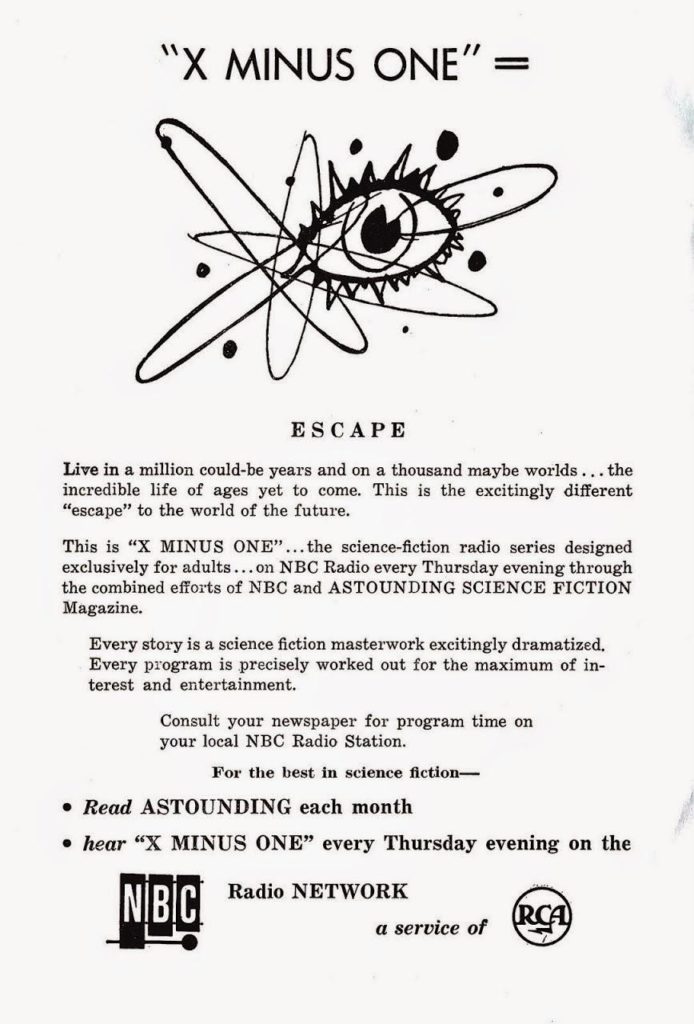
(10) TODAY’S BIRTHDAYS.
[Compiled by Cat Eldridge and John Hertz.]
- Born August 8, 1883 – Paul Stahr, Jr. Forty covers for Argosy 1925-1934. Also Collier’s, Judge, Life, People’s Home Journal, The Saturday Evening Post; book covers, posters. Here is the 10 Jan 31 Argosy. Here is the 25 Aug 34. Here is The Ship of Ishtar. Here is a World War I poster. (Died 1953) [JH]
- Born August 8, 1919 — Dino De Laurentiis. Maker of Dune obviously but less obviously also a lot of other genre including Conan the Barbarian, Flash Gordon, King Kong, Halloween II and Halloween III, Dead Zone and The Last Legion. (Died 2010.) (CE)
- Born August 8, 1930 — Terry Nation. Best-known as scriptwriter for Doctor Who and creator of the Daleks. He later created Blake’s 7. He would also write scripts for The Avengers, The Champions andMacGyver. (Died 1997.) (CE)
- Born August 8, 1935 — Donald P. Bellisario, 85. Genre shows include Tales of the Gold Monkey, Airwolf and of course, that truly amazing show Quantum Leap. Ok, is Tales of the Gold Monkey genre? Well if not SF or fantasy, it’s certainly pulp in the best sense of that term. (CE)
- Born August 8, 1937 — Dustin Hoffman, 83. Ahhh, Captian Hook, the man who got swallowed by the vast crocodile in Hook. Yeah, I like that film a lot. By no means his only genre appearance as he was Mumbles, Caprice’s fast-talking henchman in Dick Tracy (not a film I love), Mr. Edward Magorium in Mr. Magorium’s Wonder Emporium and the voice of Master Shifu in Kung Fu Panda. (CE)
- Born August 8, 1950 – John D. Berry, 70. Of New York (Fanoclasts), later Seattle. “The Club House” 1969-1972 (fanzine reviews) for Amazing. Pacific Northwest Review of Books (with Loren MacGregor). Fan Guest of Honor, Norwescon 1, VCON 13, Westercon 63. DUFF (Down Under Fan Fund) delegate. Designed the souvenir book for 15th World Fantasy Con. I daren’t say a font of knowledge but indeed he is good with them. [JH]
- Born August 8, 1958 – David Egge, 62. Thirty book and magazine covers, three dozen interiors. Here is The End of Summer. Here is The Dorsai Pacifist (in German). Here is a 1986 cover for The Mote in God’s Eye (in fact Moties don’t have faces, a non-trivial point, but see this anyway). Here is the Apr 01 Analog. [JH]
- Born August 8, 1961 – Tim Szczesuil, F.N., 59. Chaired Boskones 33, 53. Five terms as NESFA (New England SF Ass’n) President, four as Treasurer; various committees. Contributed to APA:NESFA. For NESFA Press, edited His Share of Glory (C.M. Kornbluth), Strange Days (Gardner Dozois; with Ann Broomhead). Fellow of NESFA (service award). [JH]
- Born August 8, 1971 – Phlippa Ballantine, 49. First New Zealand author to podcast her novel (Weaver’s Web, 2006; three more; PB since moved to Virginia). Three novels about the Order, five (with husband Tee Morris) about the Ministry of Peculiar Occurrences (Phoenix Rising was a top-10 SF book of the year on Goodreads, sequel The Janus Affair a Locus best-seller and Steampunk Chronicle readers’ choice for fiction), two about the Shifted World; a score of shorter stories. Website here. [JH]
- Born August 8, 1988 – Flavia Bujor, 32. Children’s novel The Prophecy of the Stones (or “Gems”), written at age 13, translated into 23 languages. A second is rumored. [JH]
(11) COMICS SECTION.
- Speed Bump shows that the pandemic has reached mythic proportions.
- Bizarro has a moral.
And Today In Comics History:
- August 8, 1978: Garfield’s sidekick, Odie, made his comic strip debut.
(12) TUNING UP. CinemaBlend pays tribute to “10 Excellent John Williams Scores In A Steven Spielberg Movie”. On their list is:
Close Encounters Of The Third Kind (1977)
The 1977 science-fiction epic Close Encounters of the Third Kind helped cement Steven Spielberg as a master of the genre, and the movie’s epic story of humans coming into contact with aliens was only made that more memorable thanks to soaring and sweeping score by John Williams.
Throughout the entire movie, the score pushes the plot along to the point where the humans finally begin to communicate with the alien mothership, which is another way of inserting Williams’ composition into the picture. The “Play The Five Tones” scene is a miraculous piece of filmmaking and orchestration as it starts rather small and hushed before going into a back and forth between the two species before growing into a grand composition that ultimately ends with a chorus of strings growing in intensity as the aliens reveal themselves to the amazement of the humans.
(13) PRIVATE EYES. NPR tells how “From Desert Battlefields To Coral Reefs, Private Satellites Revolutionize The View”.
As the U.S. military and its allies attacked the last Islamic State holdouts last year, it wasn’t clear how many civilians were still in the besieged desert town of Baghouz, Syria.
So Human Rights Watch asked a private satellite company, Planet, for its regular daily photos and also made a special request for video.
“That live video actually was instrumental in convincing us that there were thousands of civilians trapped in this pocket,” said Josh Lyons of Human Rights Watch. “Therefore the coalition forces absolutely had an obligation to stop, and to avoid bombardment of that pocket at that time.”
Which they did until the civilians fled.
Lyons, who’s based in Geneva, Switzerland, has a job title you wouldn’t expect at a human rights group: director of geospatial analysis. He says satellite imagery is increasingly a crucial component of human rights investigations, bolstering traditional eyewitness accounts, especially in areas where it’s too dangerous to send researchers
…They get those images from a handful of private, commercial satellite companies, like Planet and Maxar.
For the past three years, Planet has done something unprecedented. Its 150 satellites photograph the entire land mass of the earth every day — more than one million images every 24 hours. Pick any place on earth — from your house to the peak of Mt. Everest — and Planet is taking a photograph of it today.
“If you could visualize a string of pearls going around the poles, looking down and capturing imagery of the earth underneath it every single day,” said Rich Leshner, who runs Planet’s Washington office.
Scroll through Planet’s photo gallery and you get a bird’s eye view of the state of the world: idle cruise ships clustered off Coco Cay in the Bahamas, deserted streets around normally bustling sites like the Colosseum in Rome, and the smoke from the relentless fires set by farmers clearing land in the Amazon rainforest.
U.S. government satellites are the size of a bus. Planet’s satellites are the size of a loaf of bread. Planet is in business to make money, and its clients include the U.S. military and big corporations. But it also works with lots of non-profits and other groups it never anticipated.
(14) DAMMIT, BLANET! There is a thesis about a new type of planets, called “Blanets” (BLack Hole plANETS). “New Class of Planet Can Form Around Black Holes, Say Astronomers” – Discover has the story.
Supermassive black holes are among the most exciting and puzzling objects in the universe. These are the giant, massive bodies that sit at the heart of most, perhaps all, galaxies. Indeed, they may be the seeds from which all galaxies grow.
Supermassive black holes are at least a hundred thousand times the mass of our sun. They are often surrounded by thick clouds of gas that radiate vast amounts of energy. When this happens, they are called active galactic nuclei. Discovering the properties of these clouds, and their curious central residents, is an ongoing exercise for astrophysicists.
Now researchers have a new phenomenon to consider — the idea that planets can form in the massive clouds of dust and gas around supermassive black holes. Last year, Keichi Wada at Kagoshima University in Japan, and a couple of colleagues showed that under certain conditions planets ought to form in these clouds. These black hole planets, or blanets as the team call them, would be quite unlike any conventional planet and raise the possibility of an entirely new class of objects for astronomers to dream about.
(15) DEAD OR ALIVE? In this 2019 article, WIRED considers the possibilities after “A Crashed Israeli Lunar Lander Spilled Tardigrades on the Moon”.
…Half a world away, Nova Spivack watched a livestream of Beresheet’s mission control from a conference room in Los Angeles. As the founder of the Arch Mission Foundation, a nonprofit whose goal is to create “a backup of planet Earth,” Spivack had a lot at stake in the Beresheet mission. The spacecraft was carrying the foundation’s first lunar library, a DVD-sized archive containing 30 million pages of information, human DNA samples, and thousands of tardigrades, those microscopic “water bears” that can survive pretty much any environment—including space.
But when the Israelis confirmed Beresheet had been destroyed, Spivack was faced with a distressing question: Did he just smear the toughest animal in the known universe across the surface of the moon?
…The lunar library on the Beresheet lander consisted of 25 layers of nickel, each only a few microns thick. The first four layers contain roughly 60,000 high-resolution images of book pages, which include language primers, textbooks, and keys to decoding the other 21 layers. Those layers hold nearly all of the English Wikipedia, thousands of classic books, and even the secrets to David Copperfield’s magic tricks.
Spivack had planned to send DNA samples to the moon in future versions of the lunar library, not on this mission. But a few weeks before Spivack had to deliver the lunar library to the Israelis, however, he decided to include some DNA in the payload anyway. Ha and an engineer on Spivack’s team added a thin layer of epoxy resin between each layer of nickel, a synthetic equivalent of the fossilized tree resin that preserves ancient insects. Into the resin they tucked hair follicles and blood samples from Spivack and 24 others that he says represent a diverse genetic cross-section of human ancestry, in addition to some dehydrated tardigrades and samples from major holy sites, like the Bodhi tree in India. A few thousand extra dehydrated tardigrades were sprinkled onto tape that was attached to the lunar library.
(16) THE BARD’S SJW CREDENTIALS. Cats are the theme for Shakespeare & Beyond’s post: “Of the flattering, pampered, reviled, predatory, ‘harmless, necessary’ early modern cat”.
… While many of us today think of cats primarily as pampered pets and cherished internet weirdos, for early modern Europeans cats ran the gamut, from pests and carriers of disease, to indicators of witchcraft and other feminine misbehavior, to objects of affection and partners in play. Shakespeare’s own references to cats display such a variety. Trying to shake Hermia off in A Midsummer Night’s Dream, Lysander calls her “thou cat, thou burr! vile thing,” (3.2.270), and Macbeth’s First Witch calls out to Graymalkin, a common name for a cat that could also be applied to a “jealous or imperious old woman,” according to the Oxford English Dictionary (1.1.9). In other places, he references a cat’s behavior, as when Falstaff insists he is “as vigilant as a cat to steal cream” (Henry IV, Part 1 4.2.59). The Oxford English Dictionary also credits Shakespeare with the first reference to a cat’s purr, in All’s Well That Ends Well (5.2.19)…
(17) IS THAT PAL OR HAL? Wil Wheaton devotes a blog post to his forthcoming movie: “Wil Wheaton is a very bad friend in trailer for horror-thriller Rent-A-Pal”.
Everything about this movie makes me happy. The cast is superb, the editing and photography and music are gorgeous, and the story is REALLY FUCKING CREEPY.
I can’t wait for y’all to see this when it comes out in September.
The short description of the movie on YouTube says:
Set in 1990, a lonely bachelor named David (Brian Landis Folkins) searches for an escape from the day-to-day drudgery of caring for his aging mother (Kathleen Brady). While seeking a partner through a video dating service, he discovers a strange VHS tape called Rent-A-Pal. Hosted by the charming and charismatic Andy (Wil Wheaton), the tape offers him much-needed company, compassion, and friendship. But, Andy’s friendship comes at a cost, and David desperately struggles to afford the price of admission.
[Thanks to Mike Kennedy, Cat Eldridge, Martin Morse Wooster, JJ, John Hertz, Michael Toman, Chip Hitchcock, John King Tarpinian, Peer, and Andrew Porter for some of these stories. Title credit goes to File 770 contributing editor of the day Jack Lint.]

